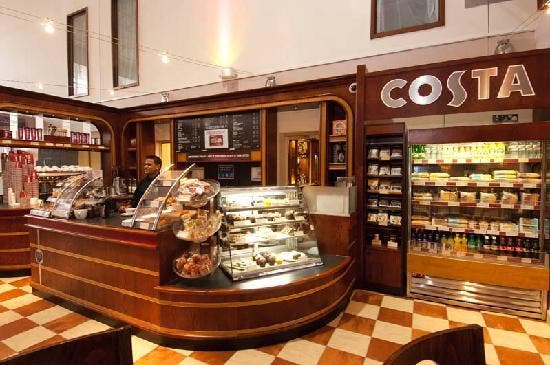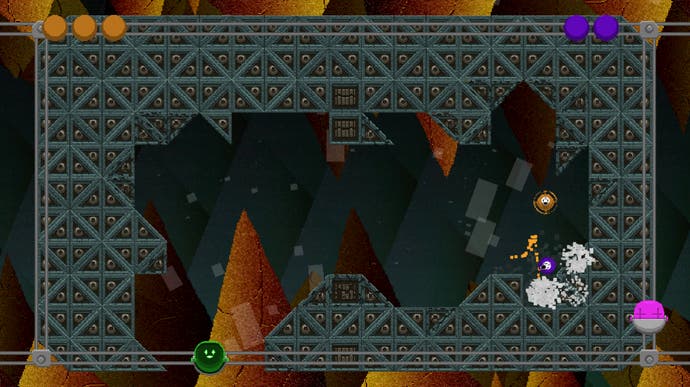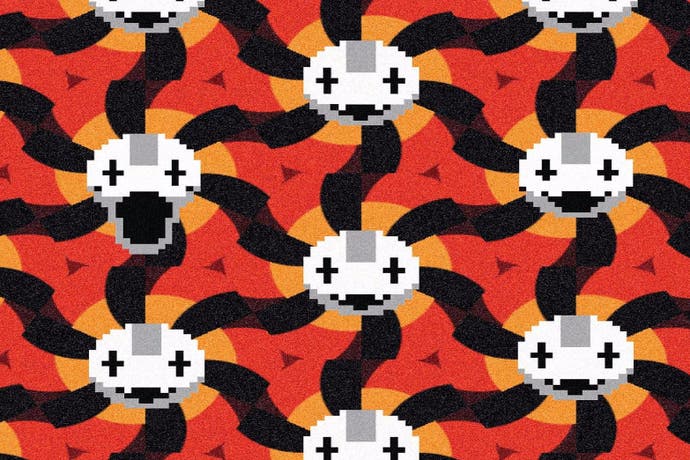Meet the dev making a Switch game in a Hounslow Costa Coffee
De Mambo safari.
It is, without a doubt, one of the strangest places I've ever been to visit a developer.
Out towards the extremities of the Piccadilly line, where the hum of the underground is met by the muted thunder of planes coming into land at Heathrow, and then out beyond for a long, grey walk along the edges of the A4 where traffic rolls past. It's proper Ballard country, edgelands of colossal car parks, stone clad semi-detached houses and sickly looking shrubs. And then, a little farther out still, there's a Premier Inn, an anonymous slab of terracotta marked only by a succession of proud flags outside boasting of the Costa Coffee within.
And it's there, in a small booth, you'll find a small team of developers working away on a new game for Nintendo's Switch.
The Dangerous Kitchen didn't start life here, but since 2014 this Costa Coffee has become their home. It's where they've come, day after day and often well into the night, to make De Mambo, their debut game which is launching next month
"We were searching for a place," says Shaun Roopra, the team's artist, designer and writer. "We did try the Starbucks down the road."

"We tried this other Costa near Greenford," says Lucy Dove, director and designer, "and it was just too crowded and busy. And our friend was like 'why don't you try Premier Inn?' and it was perfect."
You can see why it works. This is a Costa with its own unique identity, caught on the periphery of that no-man's land that is an airport lounge, that strange place where time ceases to have any meaning and the only location where it's socially acceptable to neck a pint at 8am. It's an interzone, a waiting room beyond borders where travellers pass quietly through, suspended briefly between states. It's also got nice big comfy chairs with easily accessible plugs, which helps.
"It's big enough that you can do your own thing and not feel hemmed in," says Roopra. "It's not a closed environment. Things just happen here, and it's fun. One day I went to the toilet and there was a teabag floating in there. I'd never seen that before."
There's a certain eccentricity to be found in a place like this, where out-of-towners mingle with the peculiar regulars. Over the years, some of those regulars have even earned nicknames from the team at The Dangerous Kitchen. There's Lakitu, whose name becomes self-explanatory when you hear how he lingers eternally near. "He's an old man," says Roopra, "and he's a bit odd. He gets a drink from the bar, waddles around and whenever we leave he steals our seat. Wherever we are."
There's Bowser, the security guard who once told them to move along, and then the manager who came along to their rescue. "He said no it's all good, these people can stay. So he became Donkey Kong - because he's the only one who can beat Bowser."
Mostly, though, the staff here don't seem to mind. "At first they thought we were students, but they know we're dedicated," says Roopra.
"We do buy coffee every day," adds Dove, "and we don't cause trouble."
"Well, not much trouble," Roopra counters. "And they know we're on a noble cause."
And, for the most part, The Dangerous Kitchen plays by the book. "Amit [Rai, concept artist and coder and the third and final member of the team] and I have technically stayed here all night once," says Dove. "We dodged the security guards. We didn't sleep, though, so we weren't actually breaking any rules. It's 24 hours. I think the staff take a break about 3.30, 4am. It's scary that I know that."
So what of the game itself? As you might have guessed, given the nicknames doled out to the staff of the Costa Coffee, The Dangerous Kitchen is a group of Nintendo nerds - their friendship was forged during Super Smash Bros. Brawl sessions as the three studied animation at Birmingham University, with Roopra's own path into the discipline coming via the DS' Flipnote Studio - and De Mambo, the developer's debut game, wears its influences proudly.
"It was inspired by my Smash hype," says Roopra. "The 3DS version was coming out and I was reading the Iwata Asks. And Sakurai [Smash's creator] was saying how when he makes games, he deconstructs it and then reconstructs it from the fun core - he was talking about Kirby's Air Ride, how he took out everything unnecessary and rebuilt it - so we thought let's do that with Smash. That's how it was born - it's rebuilding Smash from its core."

They've Sakurai'd Sakurai, effectively, for a boisterous multiplayer brawler where players attempt to knock each other off a variety of stages, and it's all done - fundamentally - with one button.
"I read in a magazine - it must have been in high school - and Miyamoto said the GameCube controller had one big button because all good games could only use one button. And that's always stuck with me."
De Mambo is built around one button, but there's plenty more to it than that. Tap the button and you poke the other player, hold it a little longer and you'll do a spin attack, while holding it longer still lets you fire a quartet of projectiles. It is, as so many of the games that inspired it, simple and fun, with influences that range from The Wonderful 101 through to Mario Kart and even Earthbound ("It's about Itoi's writing," explains Roopra, a man who has exquisite taste when it comes to games, "and about how you can do so much with so little").
There's even a single-player element with one-word instructions that preface levels (itself inspired by Wario Ware: Smooth Moves - "We steal a lot from other places," Roopra proudly admits), with 25 of them shipping with the game and another 26 plus another all-new mode coming as part of free post-launch support. I can see other games creeping in there with the single-player's hectic inventiveness and desire to confound, some of the brilliant Bangai-O Spirits, for example - though that's one Roopra has yet to play.
De Mambo comes together with some artful presentation - its menus are a thing to savour and would no doubt do Sakurai himself proud - so it's small wonder that there was publisher interest despite this being The Dangerous Kitchen's first game, with Chorus Worldwide picking up the game and helping it gain traction in the east. What followed is a twist that delighted the Nintendo diehards at the team.
"We tried to avoid Nintendo," says Roopra. "At that point it was the Wii U so there was no point, it was dying off. And they had Smash already, so... At the beginning it was the Vita, which we thought was perfect because it was so minimal. We tried to avoid Nintendo, but then they came to us, so what are you going to do?"
At last summer's BitSummit - Kyoto's annual indie-focused showcase - The Dangerous Kitchen's publisher informed them that Nintendo had expressed an interest. "We thought it was for the Wii U, so we were like 'nah, we don't want to do the Wii U'," says Roopra. "Then they mentioned it might be for NX, and we realised from Eurogamer's rumours that maybe it's true - maybe that is the NX!"
Later that year, at the Tokyo Game Show, a representative came along to The Dangerous Kitchen's booth to inspect its work. "I was playing single-player and he came along to play it," says Roopra. "Then afterwards he turned to us and said in English: 'very good'. It had us in tears."
The appeal of De Mambo to a Nintendo that's keen to push local multiplayer is clear, and it meant Roopra was able to get his hands on a Switch before its final reveal, with the dev kit arriving with him over Christmas. For a Nintendo fan, it's hard to think of a more fantastic present. "It was amazing unpacking it," he says. "I just couldn't stop holding it."
Nintendo's provided its own feedback - ironically, the one button set-up that was inspired by Miyamoto's own words has been watered down with the addition of a jump button, though it's still perfectly possible to play as The Dangerous Kitchen originally intended - and De Mambo has gone down exceptionally well upon its showings in Japan. There's only a short while now before it releases, and before The Dangerous Kitchen launches its first game on a platform made by the company that first inspired it.
After that there will be ports to other platforms, and then work will commence on a new game that's already been concepted out. And will it be made in the same hotel lobby, by the same Costa? "There's something about creativity here," says Dove as she takes a sip of her daily coffee. "We're a bunch of friends, and it works out being in this place. It's just more fun here."










